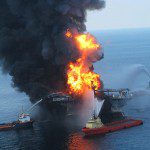Florida should lead other vulnerable non-producing partners to demand better safeguards for offshore drilling, former U.S. Sen. Bob Graham said Friday as he briefed area business leaders and Gov. Rick Scott on the findings of a national commission looking at the BP Deepwater Horizon oil spill.
 Citing Florida’s particular vulnerability to oil spills, evidenced by the millions lost in tourism revenue following the April 20 explosion, Graham said state officials should band with property insurers and other potential participants to counter an anticipated push by industry interests and oil producing states to minimize the expected regulatory reaction to the spill.
Citing Florida’s particular vulnerability to oil spills, evidenced by the millions lost in tourism revenue following the April 20 explosion, Graham said state officials should band with property insurers and other potential participants to counter an anticipated push by industry interests and oil producing states to minimize the expected regulatory reaction to the spill.
“We are at the most risk. We should be the lead of a “downstream” coalition to drive the agenda on drilling,” Graham said.
Three companies, BP, Halliburton and Transocean – bear the brunt of responsibility for the blowout and subsequent spill, the National Oil Spill Commission concluded in a report released earlier in the week The trio could face penalties of up to $20 billion for the series of missteps, poor technology and defective materials that combined to lead to the largest oil spill in U.S. history.
The commission proposes that 80 percent of any fine be directed toward improving the environmental sustainability of the Gulf, which provides other products besides oil.
Speaking to a series of affected parties including Scott, Graham, who co-chaired the commission, repeatedly ticked off a series of mistakes and oversights that led to the release of 200 million gallons of crude oil into the Gulf of Mexico. Though agreeing that more regulation is needed, some disagreed with Graham’s conclusions that drilling should stay off Florida’s coast.
Instead, Barney Bishop, president and CEO of Associated Industries of Florida, said the commission’s findings bolster AIF’s view that drilling needs to be done closer to Florida shores.
While leaks in the deep Gulf cause massive damage, the industry can handle leaks in shallow water or near the shore, he said. “This tells me we should be looking for oil in shallow water.”
Bishop also took an opposing view to Graham on the issue of national security. While Graham said the United States needs to hold onto its Gulf reserves for later use, Bishop said those resources could be used now to reduce the country’s dependence on foreign oil while technology advances to deal with a post petroleum world.
Earlier Friday, Graham spent 45 minutes behind closed doors with Scott discussing details of the report released earlier in the week. The two men may have different takes on offshore oil drilling, but both agreed that no drilling should occur until adequate safeguards are in place to drastically reduce the chances of another tragic spill.
“Neither of us wants any drilling until we are very comfortable that it is safe,” Scott told reporters after the meeting. “We can’t’ afford the environmental damage or the economic damage for our state.”
Scott has said he supports offshore drilling if proper safeguards can be guaranteed.
During his campaign for governor, Scott said he agreed with a temporary moratorium on drilling put in place after the spill by President Barack Obama. But later in December, Scott was critical of a broader decision by the administration to ban most drilling in the eastern Gulf for seven years.
By Michael Peltier
The News Service of Florida


